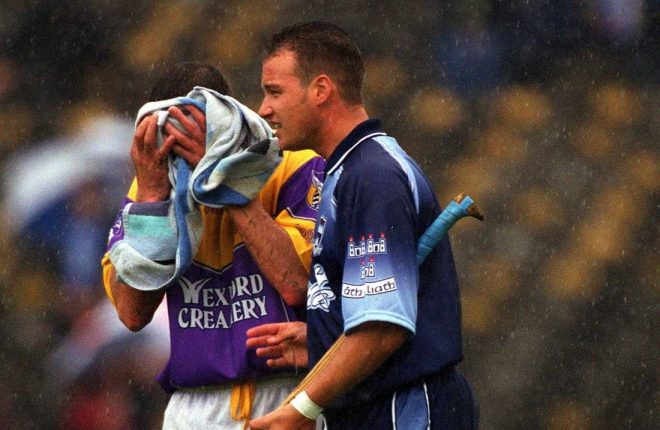
Symbolic acts like wiping your face can help trigger good mental processes
Armagh had a disastrous start to this season yet showed marked improvement in their last three League games – sufficient to boost confidence and raise expectations for their upcoming Ulster Championship clash with Cavan.
Cavan have beaten Armagh twice to date this season (McKenna Cup and National League). The question now is, “Will Armagh’s players/management enter the Ulster Championship in May with clear heads (worry free) or will they be consumed by nerves, worry, tension?
After a recent Premiership, bottom of the table ‘six point’ derby game with Norwich, Crystal Palace manager, Alan Pardew, in the glow of a 1-0 victory, said, “I was, pre-game, for first time ever, very tense and nervous (as Rory McIlroy said after a failed Masters). I’m not usually tense so I had to clear my mind and keep a clear head so that my players would not reflect my mood in their play.”
So a clear head is important, as a clear head clears your feet and let’s you play in a calm, positive way.
For some players, confidence and composure are entirely natural. For most players, however, mental skills need polished and acquired just as much as building muscle or developing skills. Good mental skills aren’t visible but their impact is. Maintaining confidence, dealing with anxiety or anger and keeping your focus are important for Armagh, as they were for Alan Pardew or if they were in any hospital, classroom, and hospital operating theatre.
Science informs us that the key to elite performance is the pre-frontal lobe – the brain area vital for decision-making, anticipating and awareness, ie, the techniques needed to keep the brain free, clear and firing. If it overloads, your ability to make good decisions is impaired quickly.
How to keep a clear mind –
here are some solutions:
1. Positive Self-Talk
Positive, energised language, such as talking out your game strengths and abilities releases dopamine – linked to certainty and confidence and thus can improve the execution of skills like passing, first touch and tackling.
2. Squashing A.N.Ts (Automatic Negative Thoughts)
You don’t put dirty petrol in your car nor unhealthy food into your body so don’t put the wrong chemicals, eg, negativity, worry, into your brain.
Practice stopping any negative thoughts and replace them with positive ones.
3. Buzz Words or Phrases
Many players used memorized key words (used in training re skill usage, tactics, game plans) to conjure up appropriate mindsets (growth) and pictures (like daydreams). A player prone to anger might say/shout ‘ICE’ (his trigger to change to positive action) to stay in control when things get heated.
4. Body Language
Body language is linked to mental state. If your head is down, shoulders slumped, your brain chemistry is negative. Head up, shoulders back keeps your brain alert.
5. Symbolic Actions
eg, ‘Dropping blades of grass’ or ‘wiping one’s jersey’ or ‘day-dreaming about a skip’. See the skip in your imagination and see yourself putting a written copy of your mistake into the skip to ‘release the memory of your mistake’, as the ‘dropped grass’ or ‘jersey wipe’ also rid you of this mistake and tell yourself it won’t happen again. There’s that self-talk again and everyone talks to themselves.
6. Focus on Simple Goals
Enhancing a player’s focus could help prevent mistakes in the first place. The pre-frontal lobe is vital for concentration but it struggles to consciously process multiple things. So have players focus on three things only, even pre-game write these on a ‘postcard’. They must be things the player can control.
The more players understand their brain and how to use it, then usage of those natural mental skills, the more efficient a player becomes.
Clearing your head does clear your feet.
Receive quality journalism wherever you are, on any device. Keep up to date from the comfort of your own home with a digital subscription.
Any time | Any place | Anywhere











